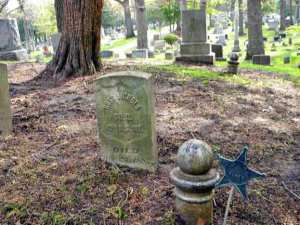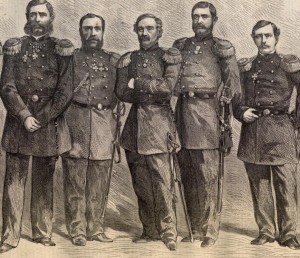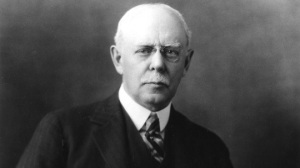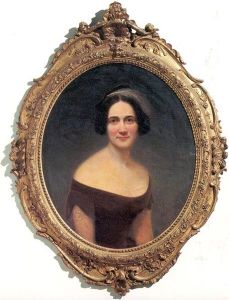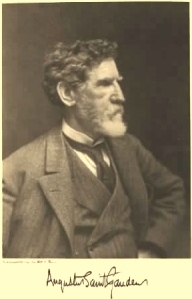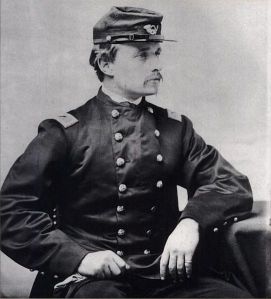Judged by Our Own Peers~ General Sherman
Lincoln is praised by Harper’s Weekly and thanked by the Russian government. The Sherman brothers exchange letters on political and military affairs. Whitman hears from his brother and from a good friend. Reverend Finney deals with finances. George Templeton Strong remains anti-British. Fighting and hard times continue in the Confederacy. The world continues to turn.
December 26– Saturday– New York City– “The President has been often accused of tardily following instead of leading public opinion. But it is his great merit that he early saw this to be a war in which the people must save themselves. If they were unequal to the task, a popular government was a failure. And therefore he has sought only to be the executive magistrate of their will, which he has divined with more sagacity than any public man in our history. It is that sagacity which now admonishes him to put into clear and simple form the settlement to which the national common-sense irresistibly tends. He has done it. Not as an advocate, or partisan, or fanatic, but with the same wisdom and passionless equity which has marked his official career from the moment he commended himself to the prayers of his old friends and neighbors at Springfield, and set forth to undertake as vast a duty as was ever committed to man.” ~ Harper’s Weekly.
December 26– Saturday– Washington, D.C.– President Lincoln has an audience with Baron de Stoeckl, to receive the thanks of Imperial Russian government for reception given Russian navy. [Although Eduard de Stoeckl holds himself out as “Baron” he is not of noble Russian birth. His father was an Austrian diplomat and his mother the daughter of a Russian diplomatic translator or “dragoman.” At this time he is 52 years old. His wife is an American, Elizabeth Howard, whom he married in 1856. He will later negotiate the sale of Alaska to the United States.]
December 27– Sunday– Albion, Illinois– Birth of Louis Lincoln Emmerson, who will serve as governor of Illinois from 1929 to 1933.
December 27– Sunday– Columbia, South Carolina– Maria Martin, age 67, a nature painter and associate of John James Audubon, dies. When her sister died in 1848, she married her brother-in-law, John Bachman, pastor of a Lutheran church. Audubon described her work as one of “superior talents, [which] assists us greatly.”
December 27– Sunday– McMinnville, Tennessee– “The fates seem determined that we shall be stripped of everything we possess. Oh! when I see the ruin around me, and think of our wasted time and home, and know that thousands among us have lost dear ones of the home circle, as well as property,– words cannot express the bitterness of my soul towards those who have plunged our people into this needless and unnatural war. Everyday my whole head and soul cry out—‘will it never, never end?’” ~ Journal of Lucy Virginia French.
December 27– Sunday– Grisson’s Bridge, Tennessee– Here and at four other locations in the state there are hard-fought skirmishes.
December 28– Monday– Copake, Columbia County, New York– “My last letter to you was dated from Springfield Mass. I went home on Saturday and had an opportunity to come up here and make some surveys for an Iron Company. I shall probably be kept here all this week and possibly part of next. . . . . Well, Walt here I am about 110 miles from New York, up in the Harlem and New York R. R. just on the edge of the state of Massachusetts, among a mass of high mountains and deep valleys. The night is one of the wildest that I ever remember, the wind is blowing a gale, the snow and sleet and rain by turns come plashing against the windows. I am boarding at an old fashioned country house . . . as comfortable quarters as I ever enjoyed– good living, good fire– good rooms and good bed– clever old Dutch-fashioned American people. I’ve just been drinking some good cider and eating some fine apples. Everything thing is as comfortable and country like.” ~ Letter from Jeff Whitman to his brother Walt.
December 28– Monday– General Lee’s headquarters, Virginia– “I have the honor to make application for Thirty days Leave of absence to visit my home in Georgia. It is over one year since I was last at home. I have during the past summer with the consent & approbation of the War Department had imported from England machinery of an important character for the purpose of manufacturing ‘card clothing’ for Cotton & woolen mills, of which all the mills of the Confederacy are much in need. The machines are not in operation, my personal attention being necessary to put them in full & successful operation, thereby advancing the interest of our whole country, as well as personal. By the Act of Congress, I could be exempted from all military duty, to remain at home & superintend said machines. But my first & greatest duty is for my country, and all I ask, is to allowed the above time now that I may be able to serve my own interest as well as my country’s.” ~ Request for leave submitted by Confederate Colonel Barrington Simeral King.
December 28– Monday– along the Hiwassee River, Meigs County, Tennessee– “A citizen named Trotter, came into our camp. He was an old man, and professed to be loyal. I interrogated him on the tobacco question. He replied, ‘The crop has been mitey poor fur a year or two. I don’t use terbacker myself, but my wife used to chaw it; but the frost has been a nippen of it fur a year or two, and it is so poor she has quit chawen ontirely.’ . . . . While we were encamped . . . a Union man, near seventy years old, was murdered by guerrillas. Not long before, a young lady, the daughter of a Methodist minister, was robbed and murdered near the same place. Murders and robberies are as common occurrences in that portion of Tennessee as marriages in Ohio, and excite about as little attention. Horse stealing is not considered an offense.” ~ Diary of Union General John Beatty.
December 29– Tuesday– Oberlin, Ohio– “Yours of the 24th is received. I suppose I understand the nature of the business in which you and my son are engaged. I see no objection to it in either a legal or moral point of view. Dr Wright of your city, owes me in the neighborhood of $1000, including the unpaid interest. I understand he is ready to pay it. I believe you hold the note. I have been endeavoring to lay by enough to render me comfortable should I live to be old. I am now in my 72nd year. I wish to so invest the little I have as to make it pay me ten percent punctually and annually and in such a way that by giving one or two years notice I or my heirs, can, if necessary withdraw the Capital from the concern. I wish to do this without assuming any risk or responsibility in regard to the management or the debts of the concern. My son tells me, as you do in this letter, that this can be done and that you and he will be amply paid for your labor and expense in managing the business. If you will draw up and execute an instrument that will put it in the right shape and send it to me, if it suits my views, I will forward it to my son for his hand and seal.” ~ Letter from Reverend Charles G Finney to G. W. Washburn. [Finney will live until August 1875. The $1000 debt would equal $18,900 today, based upon the Consumer Price Index.]

Reverend Finney
December 29– Tuesday– Lancaster, Ohio– “I wish you would introduce a bill in Congress increasing the number of cadets on this basis one from each congressional district per annum. . . . . Last summer we were called on to recommend candidates, and I was amazed to find so many worthy applicants. All who came forward for examination preferred West Point to a commission. The great want of the army is good subordinate officers. The army is a good school, but West Point is better. It is useless to deny that a special preliminary education is necessary to the military officers, and the cheapest school is now at West Point and is susceptible of infinite increase. . . . . Of course property-holding classes South deplore the devastation that marks the progress of their own and our armies, but the South is no longer consulted. The Army of the Confederacy is the South, and they still hope to worry us out. The moment we relax, they gain strength and confidence. We must hammer away and show such resistance, such bottom that even that slender hope will fail them.” ~ Letter from General William Tecumseh Sherman to his brother, Senator John Sherman. [General Sherman, on a short leave, comes home to find his brother, the senator, in New York. The general graduated from West Point in 1840. His roommate was George Thomas, now also a Union general.]
December 29– Tuesday– Mossy Creek, Jefferson County, Tennessee– In a battle that lasts about eight hours, Union forces turn back an attack by a Confederate force of about 2,000 soldiers. Federal losses total 151; Confederate losses amount to approximately 500.
December 29– Tuesday– Birmingham, England– “Learning by the last arrival from New York that [our] Government have built a fort on the site of a blast-furnace belonging to me at Chattanooga, Tennessee, situated on the bluff at the river’s bank in the town, I have taken the liberty to call your attention to a fact that is not generally known and which accidentally came to my knowledge. The site of the furnace or the fort is a bluff which rises about 80 to 100 feet perpendicularly from the river. In the face of this bluff, near high-water mark and accessible from the river, is a cavern, which I am told extends under the bluff and through the ridge for upward of 1 mile. This cavern has been the resort of fugitive slaves. It has occurred to me that as the army has been there but a short time the officers in command may not know of its existence. Judging from what I know of the position I have thought it might be a matter of some importance to you to be made aware of the fact. Whether it could be used as a mine to destroy the works over it your officers are betterable to judge than I am, but as this bluff commands the ferry, the river for some distance, and the town of Chattanooga, and the East Tennessee and Georgia Railroad, and in view of the scarcity of water in the town, it may safely be called the key of the position. And as the position is ranked as a ‘decisive strategical point of the highest order’ . . . I have taken the liberty to address you this letter.” ~ Letter from James Henderson to the War Department in Washington, D.C.
December 30– Wednesday– New York City– “Southern correspondents of British newspapers begin to write darkly and despondingly [sic] of the prospects of a slave-holding, woman-flogging Secessia, so dear to the gentry and the traders of Britain. In spite of myself, I feel more and more bitter against England every day for the moral support her ruling classes have given this atrocious rebellion . . . . as if I were to discover that one of my most intimate and trusted friends was a humbug and a scoundrel.” ~ Diary of George Templeton Strong.
December 30– Wednesday– Somerville, Massachusetts– “I found I could get nothing but promises from the booksellers for the present, so I sent you today a package of such books as I could pick from my own shelves, together with some newspapers– a variety in which I hope you will find a few things to suit your purpose. . . . . I can send you more newspapers– and perhaps more books– in a few days, if you wish for another bundle.” ~ Letter from John T. Trowbridge to Walt Whitman.
December 30– Wednesday– Lancaster, Ohio– “We must all be judged by our own peers, stand or fall by their verdict. I know I stand very high with the army, and feel no concern on that score. To-day I can do more with Admiral Porter or the Generals than any general officer out West except Grant, and with him I am as a second self. We are personal and official friends.” ~ General William Tecumseh Sherman to his brother Senator John Sherman.
December 30– Wednesday– Richmond, Virginia– “It will not be long ere many of the Yankee prisoners, now in confinement on Belle Isle, will have an opportunity of breathing the salubrious air farther South, the Government having made selection of a spot in Georgia, near Andersonville, Sumtar county, for their reception and safe-keeping, their present place of confinement being rather over-crowded. The location is on the Southwestern railroad, between Oglethorpe and Americus, where no difficulty will be encountered in supplying their wants.” ~ Richmond Sentinel.




